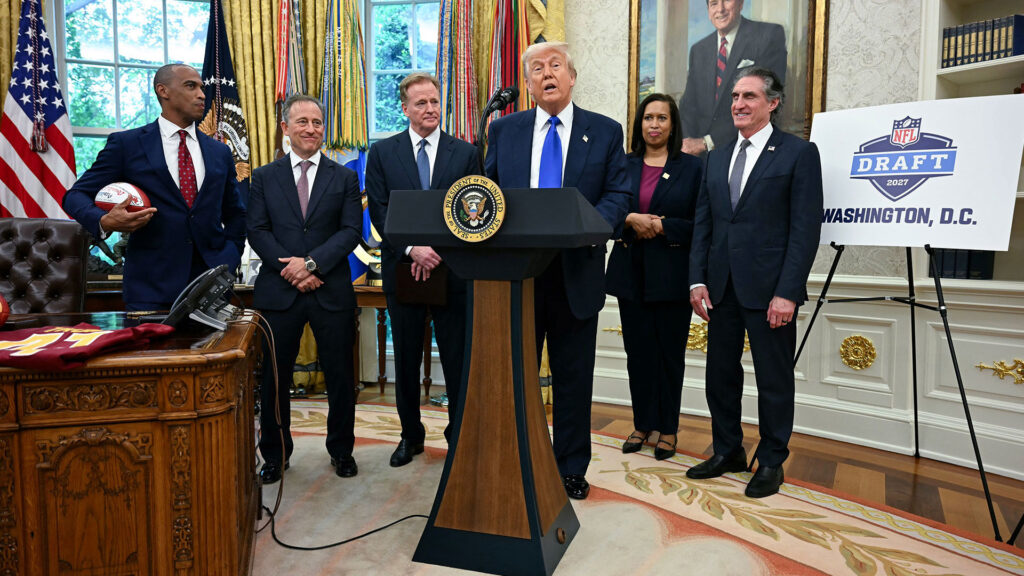
Newsletter Subscribe
Enter your email address below and subscribe to our newsletter

Enter your email address below and subscribe to our newsletter

President Donald Trump and NFL Commissioner Roger Goodell confirm that Washington D.C. will host the 2027 NFL Draft at the National Mall.
In a historic announcement from the White House, President Donald Trump and NFL Commissioner Roger Goodell jointly confirmed that Washington, D.C. will host the 2027 NFL Draft. Standing alongside Washington Commanders owner Josh Harris and Mayor Muriel Bowser, Trump declared that the three-day event will take place at the National Mall, marking the NFL’s symbolic return to America’s capital.
“We think it’s going to be a great site…We are happy to be coming back home,” Trump stated during the announcement.
This move signals more than a sports event; it reflects a revitalization of Washington, D.C.’s sporting identity and infrastructure. It’s also a political and economic win for the city, which is undergoing a major transformation through new leadership, civic investment, and NFL collaboration.
Since moving away from New York City’s Radio City Music Hall in 2015, the NFL Draft has become a roving spectacle. Cities such as Chicago, Nashville, Las Vegas, and Detroit have benefited from surging tourism and branding opportunities tied to the event. In 2024, Detroit drew a record 750,000 attendees, showcasing the economic potential of hosting the draft.
Now, it is Washington’s turn.
According to NFL data, cities that host the draft see an average $95-$125 million in direct economic impact, from hotel bookings to local business activity. This move could infuse a similar boom into the D.C. economy.
The NFL Draft announcement comes at a pivotal moment for the Washington Commanders franchise. Under the leadership of new owner Josh Harris, the team is shaking off decades of dysfunction associated with previous owner Dan Snyder.

The Commanders recently:
The synergy between sport, city governance, and federal leadership appears intentional. The NFL, once criticized for distancing itself from the political sphere, now finds itself closely aligned with national symbolism through this collaboration.
The Commanders’ announcement of a new stadium project at the RFK site underscores a broader urban renewal strategy. The 65,000-seat stadium, slated for completion by 2030, will only occupy 11% of the RFK campus. The surrounding land will be transformed into a bustling, mixed-use district:
This mirrors models used in cities like Los Angeles and Atlanta, where stadium-centered developments have revitalized entire districts.
“It’s a fusion of sport and city planning. The NFL Draft is just the beginning of what will be a decade-long transformation for Washington,” said a senior Commanders official.
Urban economists and civic planners increasingly view major sporting events as launchpads for deeper city investment. According to a KPMG analysis report, such events catalyze infrastructure improvements, enhance global visibility, and create new employment zones.
Washington D.C.’s hosting of the draft—backed by a former president, the NFL, and local government—represents a coordinated effort to brand the city as a global sports and business destination.
Meanwhile, franchises like the Commanders are no longer just football teams—they are urban stakeholders and economic engines. The NFL’s decision to return to Washington is also a strategic nod to that reality.

The 2027 NFL Draft in Washington D.C. is more than a spectacle of football fandom—it is a strategic statement. It affirms the growing bond between political power, economic development, and athletic entertainment.
With a revitalized team, a modern stadium vision, and a city open for business, Washington D.C. is poised to not only host a successful NFL Draft but to redefine itself on the national and global stage.